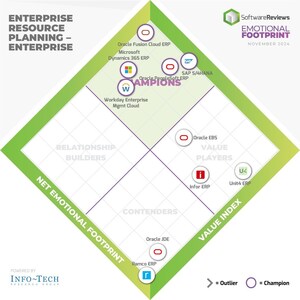The new research from global IT research and advisory firm Info-Tech Research Group provides chief information officers (CIOs) with data-driven expert insights and strategies aimed at scaling AI deployment to maximize returns.
TORONTO, Feb. 20, 2024 /PRNewswire/ - As organizations worldwide continue to harness the power of artificial intelligence (AI), building a scalable AI deployment plan has become paramount to drive innovation and efficiency in the future of work. In response to the growing need for strategic AI implementation, leading IT research and advisory firm Info-Tech Research Group has published its latest research, Build a Scalable AI Deployment Plan. The new resource was created to equip chief information officers (CIOs) with the strategies and tactics required to effectively deploy AI technologies at scale and empower them to navigate the complexities of AI adoption with confidence and precision.
"Aggressively scaling artificial intelligence with the latest concepts and leading-edge technologies is an attractive ambition for many organizations," says Andrew Kum-Seun, research director at Info-Tech Research Group. "However, rolling out AI as quickly and as broadly as possible often comes with costs that outweigh the benefits and may introduce cultural, security, and business operational risks and changes for which the stakeholders have no appetite. The lagging development of a good AI practice can further hamper the future returns of today's investments."
The firm's research highlights several obstacles organizations face when deploying AI. Often, there exists a deficiency in implementation plans that are essential for CIOs to ensure the alignment of projects with AI initiative goals. Additionally, there is often a lack of motivation or tolerance to make changes to existing business operations or enterprise systems, hindering the realization of AI's full value. Finally, many teams are ill-equipped to meet the demands and complexities of scaled AI implementations, further impeding successful deployment.
"The right AI initiatives help CIOs understand new AI technologies, their measurable impacts, and how these new technologies benefit their teams," explains Bhavya Vora, research analyst at Info-Tech Research Group. "Appropriate initiatives also lend themselves to establishing good foundational capabilities and building the necessary relationships and collaborations to be successful in AI deployment. When implemented correctly, AI initiatives enable the exploration of more sophisticated, complicated, and innovative opportunities to drive new value to the IT team, department, and the broader organization."
In the blueprint, the firm emphasizes that deploying AI necessitates the seamless collaboration of various roles, capabilities, and technologies to achieve stakeholders' desired outcomes. With collective participation in the planning process, organizations can ensure that all perspectives are accommodated in the solution design and that the necessary supports are in place. Info-Tech further underscores that CIOs should consider the following key elements when deploying AI:
- AI Solution Design: Break down the AI initiative into granular steps, such as building use case models and charting systems, data, and process flows, which serve as a critical component of the strategy. Identifying each step clarifies the initiative and lays the groundwork for seamless integration, thus accelerating AI implementation across various business functions.
- AI Capabilities: Establishing a frugal AI mindset enables prioritization of actionable progress over perfection. Organizations can effectively scale AI initiatives by concentrating on leveraging existing strengths and strategically addressing gaps. This approach emphasizes practicality and efficiency, facilitating meaningful advancements in AI implementation.
- AI Budget: Quantifying the impact of scaling the initiative involves conducting estimations to evaluate cost factors against the backdrop of risk and value potential. This systematic approach enables organizations to assess the feasibility of scaling AI initiatives while considering associated risks and potential value.
- Roadmap and Backlog: Crafting a roadmap and maintaining a prioritized backlog of AI initiatives act as a strategic compass, guiding the phased deployment of AI. By estimating and prioritizing the backlog of initiatives, organizations can assess the degree of effort and value, thus ensuring efficient allocation of resources and maximizing the impact of AI implementation.
The firm suggests it is imperative for CIOs and their organizations to position their AI deployment plan as a collectively owned and managed artifact focused on sharing, enabling, and continuously improving. By embracing scalable deployment plans, organizations can unlock new realms of innovation, efficiency, and competitive advantage in today's dynamic landscape.
To access the full blueprint, please visit Build a Scalable AI Deployment Plan.
For exclusive and timely commentary from Andrew Kum-Seun or Bhavya Vora, experts in AI deployment, please contact [email protected].
Info-Tech Research Group is one of the world's leading information technology research and advisory firms, proudly serving over 30,000 IT professionals. The company produces unbiased and highly relevant research to help CIOs and IT leaders make strategic, timely, and well-informed decisions. For 25 years, Info-Tech has partnered closely with IT teams to provide them with everything they need, from actionable tools to analyst guidance, ensuring they deliver measurable results for their organizations.
Media professionals can register for unrestricted access to research across IT, HR, and software and over 200 IT and industry analysts through the firm's Media Insiders program. To gain access, contact [email protected].
For information about Info-Tech Research Group or to access the latest research, visit infotech.com and connect via LinkedIn and X.
SOURCE Info-Tech Research Group

WANT YOUR COMPANY'S NEWS FEATURED ON PRNEWSWIRE.COM?
Newsrooms &
Influencers
Digital Media
Outlets
Journalists
Opted In






Share this article